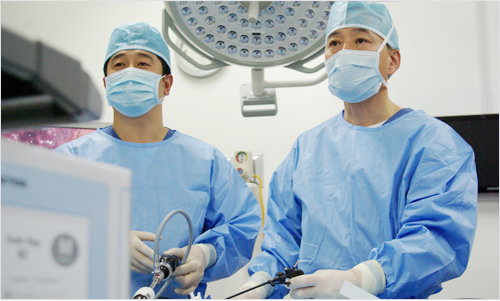From the moment we first meet with patients,
we will take care of them like a family with faith, hope, and love.
Wellness Hospital treats even the hearts of customers through experts treatment and specialized medical services.
The appendix hangs like a rat's tail from the cecum, the first part of the large intestine that is connected to the small intestine. Inflammation of the appendix is commonly referred to as appendicitis. Symptoms of acute appendicitis appear differently depending on age, gender, or the location of the appendix in the stomach, and there are many other diseases that cause similar symptoms, so its diagnosis is often difficult. The most characteristic symptom is pain in the right lower abdomen, and there are cases where the patient complains of very severe pain, but in many cases the pain is mild, so it is difficult to diagnose acute appendicitis.
Why Does It Occur?
Acute appendicitis is an inflammation of the appendix due to blockage of the entrance to the appendix, which leads to swelling of the appendix and blockage of blood circulation. In most cases, the entrance to the appendix is blocked by swelling of the lymph glands around the appendix, but the entrance to the appendix can also be blocked by feces or other external substances. In most cases of acute appendicitis, the appendix becomes inflamed within 3 days of the onset of symptoms, and when it becomes severe, an abscess around the appendix or pus spreads throughout the stomach, causing peritonitis.
If the appendix ruptures like this, the operation becomes very complicated, the recovery process after surgery becomes very difficult, and many problems can be caused.
2
Diagnosis and Examination
-
· The opinion of an surgeon
The symptoms of acute appendicitis may change over time and need the opinion of an experienced surgeon. Considering that acute appendicitis develops into a perforation in 100% of cases within 72 hours, an accurate diagnosis and prompt surgical decision are essential.
-
· Examination and surgery
For accurate diagnosis, various tests such as blood test, urine test, simple abdominal radiography, abdominal ultrasound, abdominal CT scan, and colonoscopy are performed, but the important thing is to conduct surgery as soon as possible before a perforation occurs.
For safe anesthesia during surgery, you must fast for at least 8 hours before surgery. If there is food in your stomach, you may vomit when you wake up from anesthesia, and food can enter the airways and cause very dangerous complications.
Therefore, absolute fasting is required when symptoms are suggestive of acute appendicitis. Only then can the operation be performed immediately without waiting for an 8-hour fasting time.



